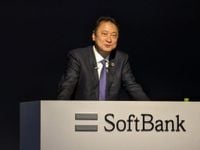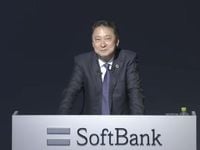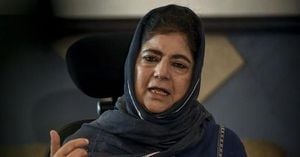In a significant announcement made on May 8, 2025, SoftBank's CEO Junichi Miyakawa revealed that the company plans to introduce direct satellite-to-smartphone communication services by 2026. This development positions SoftBank to compete in a rapidly evolving telecommunications landscape, especially as rivals like KDDI and Rakuten Mobile have already embarked on similar ventures.
Miyakawa disclosed this information during a financial results briefing, where he noted that preparations with the satellite company are complete, although he refrained from naming the specific partner. This strategic move comes as KDDI has already launched its 'au Starlink Direct' service in collaboration with Starlink, and Rakuten Mobile is preparing to offer services utilizing AST SpaceMobile satellites in the same timeframe.
SoftBank's entry into satellite communication aligns with its ongoing commitment to innovation in the telecommunications sector. Miyakawa emphasized that the company will also continue its work on the High Altitude Platform Station (HAPS) project, which aims to enhance connectivity through stratospheric platforms. He stated, "We are currently in discussions with the Ministry of Land, Infrastructure, Transport and Tourism regarding HAPS, and we hope to make an announcement soon if negotiations are successful."
In addition to satellite communications, Miyakawa addressed the recent price hikes in the telecommunications industry, particularly in light of competitors' new pricing strategies. NTT Docomo announced its 'Docomo MAX' plan on April 24, 2025, and KDDI followed suit with the 'au Value Link Plan' on May 7, 2025, both of which involve increased rates for consumers. In response, Miyakawa conveyed his desire to approach pricing changes with caution, stating, "I want to carefully refine our strategy as we consider how to adjust our prices."
Despite the pressure on the industry to reduce prices, Miyakawa acknowledged the necessity of reviewing pricing strategies for the healthy growth of the sector. He remarked, "The top two companies in market share have moved ahead with price increases. I see this as an opportunity. We have made efforts to overcome deflationary structures and reduce costs, but we are nearing our limits. A review of prices is timely for the healthy growth of the industry, and we want to align ourselves in that direction."
However, he clarified that any adjustments would not be rushed, emphasizing the importance of determining the best timing for any potential increases. He stated, "While we may have opportunities to attract customers by keeping our prices stable amidst competitors' increases, we must carefully calculate the best timing based on our business strategy."
Furthermore, Miyakawa expressed his concerns about the implications of pricing strategies that may not benefit consumers. He commented, "While we can create pricing plans that are comparable to others, I question whether that will satisfy our customers. I want to take the time to carefully strategize our approach."
On the technology front, SoftBank also announced its intention to develop 'next-generation memory' for AI data centers, marking a significant shift in its business focus. During the same briefing, Miyakawa explained that the company aims to create high-performance memory that can efficiently transfer large volumes of data to GPUs, which are increasingly crucial for AI operations.
Rather than manufacturing memory, SoftBank plans to operate under an intellectual property (IP) model, licensing its innovations to other manufacturers. Miyakawa stated, "We do not aspire to become a memory manufacturer. Our goal is to realize patents related to memory in Japan and eliminate bottlenecks in processing within AI data centers, such as web crawling."
Over the next two years, SoftBank intends to collaborate with partner companies to develop samples of the core components of this next-generation memory, with an estimated investment of approximately 30 billion yen. Miyakawa emphasized the importance of this endeavor, noting that as AI's focus shifts to inference, the need for high-performance memory will become even more critical.
As SoftBank navigates these advancements in satellite communication and AI technology, the company remains committed to adapting its strategies in a competitive market. The upcoming years will be pivotal for SoftBank as it seeks to solidify its position in the telecommunications and technology sectors, while also addressing the evolving needs of consumers.






